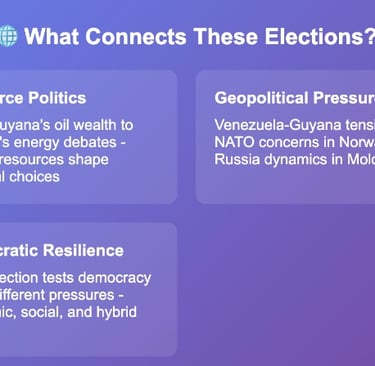Elections Right Now
Your Global Election Tracker.
Join our mailing list for updates and analyses on future elections.
September 2025 - Caribbean and Arctic oil with Eastern European crossroad: Guyana, Norway and Moldova votes
In September 2025, three small countries with major differences choose their new leaders. Is it possible to compare anything at all between these three elections? What are the major topics at stake? Follow us when we try to compare three Elections Right Now.
Editor
9/14/20254 min read


Sharing oil profit and going east or west?
September 2025 marks a global election sprint spanning three continents, spotlighting how democracy adapts to diverse political, economic, and social realities. The recent Guyana and Norway elections, combined with the upcoming vote in Moldova, reveal intriguing patterns and stark contrasts that deepen our understanding of democratic resilience in a rapidly changing world.
Guyana: Battling Oil Wealth and Persistent Poverty
Kicking off the month on September 1-2, Guyana’s general elections were shaped by the country’s dramatic transformation due to offshore oil discoveries. President Irfaan Ali (People’s Progressive Party/Civic) and main challenger Aubrey Norton debated amid soaring national wealth and ongoing poverty. Voters grappled with balancing immediate economic benefits and long-term resource management, all while under the shadow of Venezuela's territorial claims on the key Essequibo oil region.
This election highlighted a key pattern: resource wealth does not automatically translate into widespread prosperity or political stability. The contrast between Guyana’s fast-growing economy and continued social struggles tested the electorate’s patience and expectations from democratic governance.
President Irfaan Ali and his People's Progressive Party/Civic (PPP/C) won reelection with 55.3% of the vote, securing 36 of 65 parliamentary seats. A newcomer, We Invest in Nationhood (WIN), emerged as the main opposition with 24.9% of the vote and 16 seats, displacing the longtime opposition alliance. Voter turnout was about 58.4%. The result strengthens the PPP/C mandate to manage Guyana’s rapid oil-driven economic growth, but challenges remain in addressing widespread poverty and social inequality. The rise of WIN signals a shift in political dynamics, potentially reshaping future coalition politics.
Regionally, Guyana’s stability is critical amid Venezuela’s territorial claims over the oil-rich Essequibo region. Globally, Guyana’s expanding oil production attracts strategic interest from the U.S. and China, highlighting its growing geopolitical importance. Effective governance and inclusive resource management will be key to securing Guyana’s democratic and economic future.
Norway: Social Democracy’s Nordic Test
Across the Atlantic, votes were cast in another oil-influenced society. On September 8, Norway held its parliamentary elections for the 2025-2029 Storting term. Norway, a pioneer of oil-based wealth since the 1960s, faces a different democratic challenge: maintaining social democratic values amid global political shifts.
The Labour Party defended its 2021 win against a Conservative comeback, with heated debates over tax cuts and North Sea oil policy. The Conservative party did its worst elections in decades, but the further right Progress Party got second biggest after Labour. A remixed Labour coalition will continue to rule, but has to be aware of powerful parliament votes from the blue block also in the future.
Norway’s election exemplifies mature democracy evolving through institutional innovation— like the removal of preferential voting and extended advance voting periods— while confronting whether its oil wealth model can sustain welfare state ambitions in a climate-conscious era.
Moldova: The Upcoming Geopolitical Crossroads
Slated for September 28, Moldova’s parliamentary elections represent a high-stakes geopolitical choice between deeper European integration and Russian influence. Women candidates reaching 44.5% signal progress in political representation even as the country confronts economic and identity challenges. Moldova’s path will shape Eastern Europe’s democratic future amid geopolitical tension.
The upcoming Moldova parliamentary election on September 28, 2025, features 23 candidates including 15 parties, 4 blocs, and 4 independents. Major contenders include the ruling pro-European Party of Action and Solidarity (PAS) led by Maia Sandu, seeking to maintain its majority, and a strong opposition coalition led by Alexandr Stoianoglo, which aims to improve ties with Russia while maintaining some western orientation.
Key election topics focus on Moldova’s continued European Union integration versus Russian influence, economic challenges including energy security and stagnation, and the fight against corruption. The election outcome is seen as pivotal for Moldova’s future direction, determining whether it strengthens its EU path or risks destabilization amid Russian geopolitical pressures. While war rages in the bordering country Ukraine, the world is very curious about how Moldovas next government will look like.
In Moldova, Gender representation is notable, with about 44.5% women among candidates. The election will also test Moldova’s democratic resilience against ongoing hybrid interference and attempts to influence the vote. The opposition has received criticism of foreign social media support, for example.
Patterns and Differences: Democracy Across Contexts
Resource Wealth and Governance: Both Guyana and Norway showcase democracies shaped by oil riches but at different stages—Guyana’s nascent oil economy struggles with inclusive growth, while Norway grapples with transitioning past fossil fuel dependency.
Institutional Maturity: Norway reflects a stable, evolving democracy balancing tradition and reform, whereas Guyana's election process must assure trust amid external pressures and internal expectations.
Geopolitics and Identity: Moldova’s election underscores democracy’s vulnerability to external influence and the role of identity politics, contrasting with Guyana's territorial disputes and Norway’s secure NATO alignment.
Voter Engagement and Representation: Norway’s extended advance voting and Moldova’s high female candidacy percentage highlight varied approaches to bolstering democratic participation and inclusivity.
What This Means for Democracy
September 2025’s electoral trio illustrates democracy’s adaptability across very different political landscapes:
It reminds us democracy is not a one-size-fits-all solution but evolves based on economic realities, institutional legacies, and geopolitical pressures.
It shows voters confront complex trade-offs—balancing prosperity with fairness, stability with change, and national identity with global interdependence.
It highlights the ongoing global experiment of democracy still striving to give voice to ordinary citizens under shifting circumstances.
As Guyana and Norway tally their results and Moldova prepares to vote, these elections are more than isolated events—they are chapters in the global story of democracy’s endurance and transformation.
Contacts
Socials
Subscribe to our newsletter
About us:
We are a global election tracker.
We follow global affairs trough elections.
We use and experiment with AI supported technologies in the work with this website.
